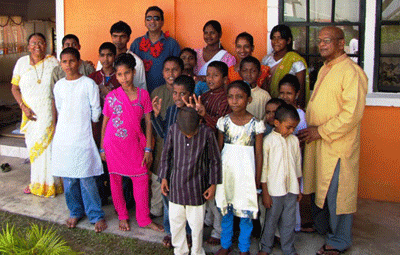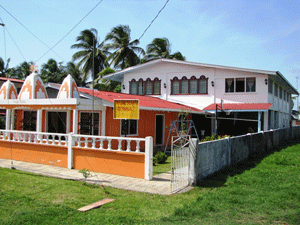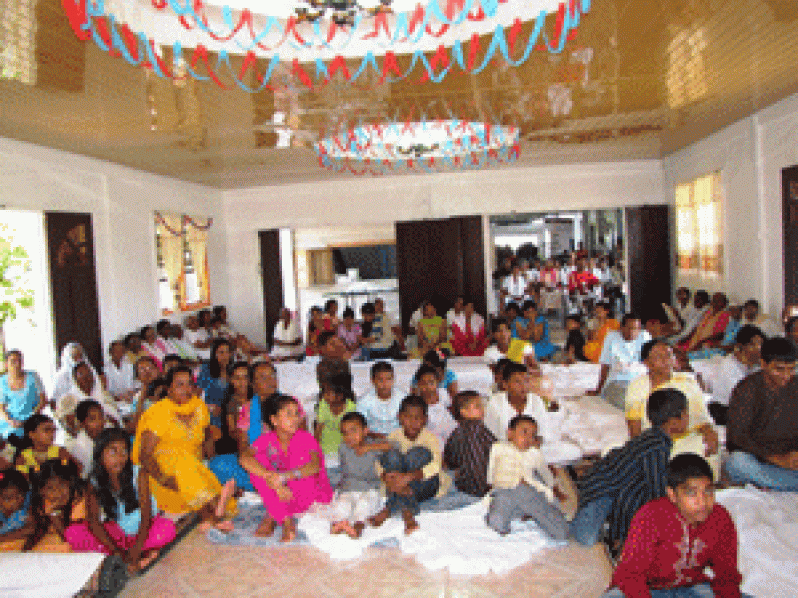– Minister Nandlall tells children at Prabha Sharan orphanage, as they celebrate Holi
Service to humanity, one of the eight forms of devotion within the Hindu religion, was displayed in a unique manner in the run-up to this year’s Phagwah celebrations over the weekend.  The Prabha Sharan Orphanage of Cornelia Ida, on the West Coast Demerara, is an organisation that exists through charity and the organisers and the 20-odd children, aged between 5 – 17 years, displayed one of the major forms of devotion by respectfully acknowledging their elders in their annual Phagwah programme.
The Prabha Sharan Orphanage of Cornelia Ida, on the West Coast Demerara, is an organisation that exists through charity and the organisers and the 20-odd children, aged between 5 – 17 years, displayed one of the major forms of devotion by respectfully acknowledging their elders in their annual Phagwah programme.
Special invitee, Attorney General and Minister of Legal Affairs, Anil Nandlall, commended them, even as he pointed out the ways in which children and orphans can eradicate poverty from their lives.
Established in 2005, the orphanage is being run by a caretaker in the absence of Pandit Premnarayan and Chandrauti Gangadin, who reside in Canada, and the children are being brought up in the Hindu religion.
Minister Nandlall observed that considering the circumstances from where the children came, and under which they were brought to the orphanage, they went through a tremendous amount of suffering.
“I am so happy that people like the Gangadins of the world can come forward and make the contribution that they are making,” the minister said.
He emphasised that the children of any country or society are the future of that country or society, which in turn is integrally linked to the future of “these very children, because they will shape and mould the Guyana of tomorrow. Hence the importance of ensuring that in this formative aspect of their life, they are inculcated with the right values, morals and otherwise,” he added.
The minister also explained that while psychologists say that the formative years of a child have the most important impact on his/her life as an adult, this is so because “it is what is imparted to the child now; it is what is imbued in the child now; it is what is instilled in the child now that will have the most fundamental effect on the destiny of that child.” This, the minister stressed, is the nature of the responsibility that the Gangadins and those who are working with them had undertaken when they made the decision to establish an orphanage.
This, the minister stressed, is the nature of the responsibility that the Gangadins and those who are working with them had undertaken when they made the decision to establish an orphanage.
“It is one of the most important decisions that anyone can make in any lifetime. Because it involves the responsibility of taking into your hands the lives of several children, and your interaction with those children will be the determining factor in who they are and what they turn out to be… it is extremely important that the nature of this responsibility is understood.”
Minister Nandlall also stressed the administrators’ focus which is to use education to uplift and transform the lives of the children. He declared that this is what every orphanage should seek to emulate, “because orphans come from the depth of poverty…and the people who are experts in studying poverty … have recognised universally that education is perhaps the surest and most effective exit out of a cycle of poverty.”
Noting that education can be an expensive investment for those below the poverty line, he said it means that they cannot afford education and will turn to crime and other like activities to extricate themselves from poverty.
Pointing to the fact that the administration has invested tremendously in poverty alleviation, Minister Nandlall stated that in 1992, over 75% of Guyanese were living below the poverty line, today it is less than 25%.
“However that is still unacceptable, and it is the objective of the government to work tirelessly to ensure that there is a complete and absolute removal of poverty…no person in our country must be poor,” he declared.
He pointed out that national budgets from 1992 to now ensured that 1/3 goes into the social sector, the provision of health care, education, housing and water. These areas are the focus for the major block of resources of the budget every year, since it is felt that these are the areas that will target poverty.
In another move to remove poverty through education, the One Laptop Per Family Programme was established. A survey recognised that out of 150,000 families in Guyana, about 50,000 or more of these families could not afford a computer or have access to one. At the end of the OLPF exercise, government will ensure that there is a computer in the home of each family that cannot afford one.
He emphasised that the purpose is to ensure that persons are presented with the opportunity to compete at every level with anyone else in society, “because we know and you know the important role that a computer can play in the life of a family, in the life of a student. The computer is a vista that opens, through which you can access the world.”
While the focus for orphans will be to escape poverty through education, they will also need protection as children and laws have been put in place for this. Thus far, the Protection of Children Bill, the Status of the Children Bill, the Adoption of the Children Bill, and the Child Care, Protection Agency Bill, Juvenile Justice, custody, contact, Guardianship and Maintenance Bills were passed in the National Assembly.
“We, perhaps more than most Caribbean countries, have the most modern legislation landscape that we have established in the last Parliament. Modernising all of our laws… all designed to ensure that the welfare of the children of our country is protected and advanced. We have established a child protection agency whose responsibility primarily is to ensure that the government’s policies on child care are executed, and there must be a constant body to make recommendations to the government to improve the situation in the country as it relates to children.”



.jpg)








